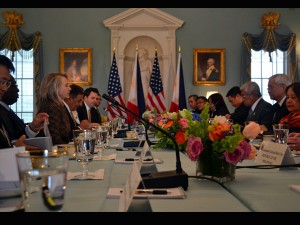Philippines, US agree to build up PH defenses

2+2 MEETING US officials led by secretary of State Hillary Clinton and Philippine officials led by Foreign Secretary Albert del Rosario meet in Washington to discuss issues on security and defense issues. PHOTO: DFA
MANILA, Philippines—Noting their alliance remains an “anchor for peace, stability and prosperity in the Asia-Pacific region,” the Philippines and the United States have reaffirmed their obligations under the 1951 Mutual Defense Treaty, as well as the 2011 Manila Declaration, so that their partnership would remain responsive in meeting changing global and regional issues.
In a joint statement issued on Sunday after the “2 + 2 meeting” between their defense and foreign secretaries in Washington, the two governments vowed to “jointly explore modalities for strengthening the defense capabilities of the Philippines in order to establish a minimum credible defense posture through robust cooperative security assistance programs.”
The two countries also promised to “cooperate on building the Philippines’ maritime security presence and capabilities and strengthening its maritime domain awareness in order to contribute to national defense and enhanced regional security related to issues, such as illegal fishing, transnational crime and natural disasters.”
“To that end, the US intends to transfer a second high endurance (Hamilton-class) cutter to the Philippines this year,” said the statement.
Manila was represented in the “2 + 2” meeting by Foreign Secretary Albert del Rosario and Defense Secretary Voltaire Gazmin while the US side was led by their counterparts, Secretary of State Hillary Clinton and Defense Secretary Leon Panetta.
Article continues after this advertisementThe two sides said they would “ensure that our collective defense capabilities and communications infrastructure are operationally and materially capable of countering the full spectrum of traditional and non-traditional threats.”
Article continues after this advertisementThe US did not categorically state, however, that it was taking the side of the Philippines in its Scarborough Shoal dispute with China. But it joined Manila in reaffirming their “common interest in maintaining freedom of navigation, unimpeded lawful commerce and transit of people across the seas and subscribe to a rules-based approach in resolving competing claims in maritime areas through peaceful, collaborative, multilateral and diplomatic processes within the framework of international law, including the United Nations Convention on the Law of the Sea.”
The two sides also committed to:
• Work to expand joint intelligence, surveillance and reconnaissance activities under the National Coast Watch System (of the Philippines) to deter and respect proactively to various situations in the region.
• Continue joint military training and exercises, such as the recently completed Balikatan 2012 to “enhance force interoperability.”
• Review joint exercises and training activities and “give priority to those that have high value and great impact with regard to our common objectives, such as but not limited to maritime security.”
• Continue joint counter-terrorism efforts, including “US non-combat support to the Philippine security services in combating al-Qaida-linked terrorist groups in the southern Philippines.”
• Endeavor to increase bilateral trade and investment through continuing their Trade and Investment Framework Agreement discussions, among others.
• Support programs to increase tourism exchanges between the two countries and identify and address obstacles to more vibrant tourism exchanges.
They noted that the Philippines-US alliance was “stronger than ever, reflecting the deep and abiding ties linking our two nations and forged through a history of shared sacrifice and common purpose.”
“Seventy years ago this month, thousands of US and Filipino troops served together in defense of our last strongholds at Corregidor and Bataan. Later, when we signed our Mutual Defense Treaty in 1951, we united against the spread of communism. Today, Americans and Filipinos are inextricably bound by common values and shared aspirations and deepening people-to-people ties,” they said.
They emphasized “our alliance remains an anchor for peace, stability and prosperity in the Asia-Pacific region…Our consultations seek to address common strategic and security objectives, promote economic cooperation, advance people-to-people ties and enshrine principles of good governance and the rule of law.”
They also stressed that their alliance “remains an essential element undergirding regional peace, security and prosperity.”
“As our nations reflect on the strength and durability of our alliance, we also look to enhance our relationship in order to address even more effectively the range of regional challenges and opportunities that are of interest to both our governments. Both nations, therefore, resolve to continue our regular consultation and coordination on these issues,” they added.
Meanwhile, the militant group Bagong Alysansang Makabayan slammed the 2 + 2 meeting, saying it “merely reinforced the Philippine dependence on its former colonizer but will not amount to much in terms of helping the Philippines assert its claims over disputed territories in the region.”
In a statement, Bayan secretary general Renato Reyes Jr. said the country “will again be waiting for more second-hand military equipment being thrown its way by the US government.”
“The Philippines will again pin its hopes of armed forces modernization on US hand-me-downs. But the reality is that all these do not really help in strengthening sovereignty nor in asserting our claims over disputed territories,” said Reyes.
According to Reyes, the joint statement issued by the two sides “indicated that the Mutual Logistics Support Agreement (between Manila and Washington) will likely be extended.”
The MLSA allows US forces to be serviced by the Philippine government through logistical support of various kinds.